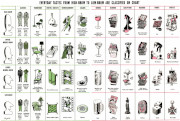|
Home
|
Mar 7, 2024
This week’s themeWords derived from body parts This week’s words tergiversate loggerhead hough middlebrow footloose 
Everyday Tastes from Highbrow to Lowbrow (Life magazine, Apr 11, 1949)
Illustration: Tom Funk
A.Word.A.Day
with Anu Gargmiddlebrow
PRONUNCIATION:
MEANING:
ETYMOLOGY:
Formed on the pattern of highbrow and lowbrow. From middle, from Old
English middel (middle) + bru (brow). Earliest documented use: 1912.
NOTES:
In the grand, often ridiculous, opera of cultural tastes, highbrow
is reserved for the stuff that makes you appear smart at dinner parties --
Shakespeare, who basically invented the plot twist, Mozart, whose music you
pretend to understand, and Nabokov, who wrote books that double as vocabulary
workouts. On the flip side, lowbrow is the guilty-pleasure aisle -- home to
the Kardashians, who’ve made an empire out of... being Kardashians, superhero
movies (because who needs subtlety when you have explosions), and kitsch art
(the velvet Elvis paintings of the world). What’s brow doing here? It comes from phrenology, a pseudoscience that claimed to tell about a person’s characteristics from the shape of their skull. Someone with a large forehead (highbrow) was considered intellectual. The origin of this classification should tell us all we need to know about dividing people into highbrow and lowbrow. Also, consider that brows go up and down with time. Shakespeare is highbrow in modern times, but in his days Shakespeare was popular entertainment. Peasants and royalty, illiterates and intellectuals, they all enjoyed performances of his plays. It just goes to show, today’s pop culture may turn out to be tomorrow’s classic. USAGE:
“Rebeck’s 100-minute tale of grief and release is the sort of
middlebrow crowd-pleaser that used to be common fare.” David Cote; Danny DeVito Hoards Laughter and Tears in “I Need That”; The New York Observer; Nov 2, 2023. See more usage examples of middlebrow in Vocabulary.com’s dictionary. A THOUGHT FOR TODAY:
Nature's laws affirm instead of prohibit. If you violate her laws, you are
your own prosecuting attorney, judge, jury, and hangman. -Luther Burbank,
horticulturist (7 Mar 1849-1926)
|
|
Subscriber Services
Awards | Stats | Links | Privacy Policy
Contribute | Advertise
Awards | Stats | Links | Privacy Policy
Contribute | Advertise
© 1994-2025 Wordsmith